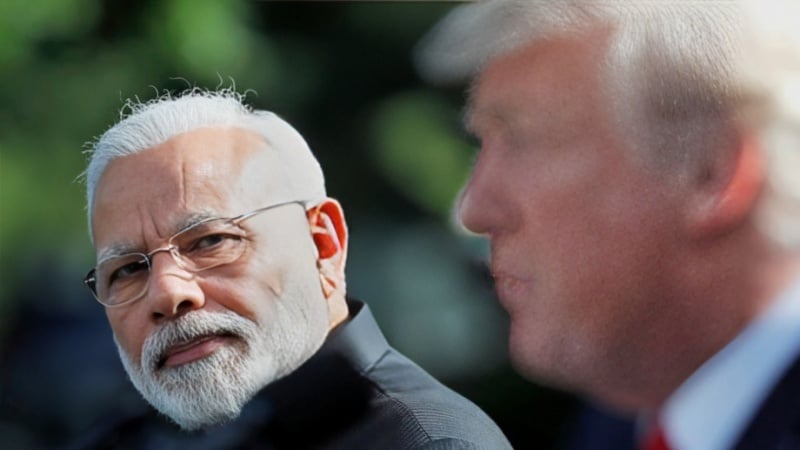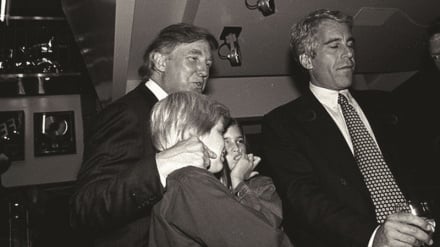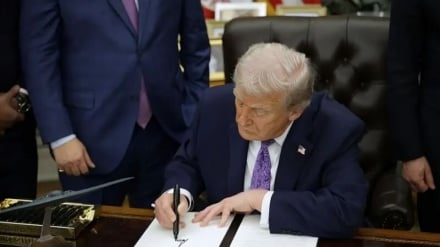Why India's hopes in America have turned to disappointment?
-

Modi and Trump
Pars Today – Trump's decision to impose a 25% tariff on Indian exports to the U.S. has drawn a negative reaction from New Delhi.
According to Pars Today, U.S. President Donald Trump announced on Wednesday that, starting August 1, he would not extend the deadline for implementing new global tariffs. In his message, Trump referred to August 1 as the implementation of "Freedom Day" and stated that India is among the countries facing these tariffs, with a 25% duty set to be imposed.
Trump argued that India would also face penalties due to its peaceful relations with Russia and its imports of Russian energy products. He wrote: "They have always purchased a significant portion of their military equipment from Russia and, alongside China, are the largest buyers of Russian energy, as the world demands Russia stop the slaughter in Ukraine. Not everything is fine!" He also hinted at penalties against New Delhi for purchasing weapons and oil from Russia, though he did not provide specifics.
Russia remained India’s largest oil supplier in the first six months of this year. Non-Western-aligned countries like India, prioritizing their national interests, have sought to maintain trade relations with Russia, particularly in energy commodities such as oil and gas, and have continued importing Russian oil despite Western pressure.
Trump's latest move against India could strain Washington's relations with the world's most populous nation. The recent decision by Trump has imposed new tariffs on India more prominently than on other major U.S. trade partners, jeopardizing months of trade negotiations between Washington and New Delhi.
In response, the Indian government stated in an official release: "India and the U.S. have been engaged in negotiations over recent months to conclude a fair, balanced, and mutually beneficial bilateral trade agreement. We remain committed to achieving this objective." Sources close to the talks revealed that this move has undermined months of efforts to reach a limited trade deal between the two countries.
New Delhi also reacted to Donald Trump's announcement of 25% tariffs on Indian goods by asserting it would protect its interests along with those of Indian farmers and entrepreneurs. The recent trade talks between India and the U.S. have failed to yield any agreement, as Trump maintains maximalist demands while New Delhi shows no willingness to fully open its dairy and agricultural sectors to American products.
India has consistently resisted U.S. pressure to open its domestic market to agricultural products, maintaining the livelihoods of millions of farmers as its red line. As the world's largest economy, the U.S. currently faces a $45.7 billion trade deficit with India, the world's fifth-largest economy. The new tariffs will impact Indian exports to the U.S., which were estimated at about $87 billion in 2024, covering labor-intensive sectors such as textiles, pharmaceuticals, gold and jewelry, and chemical products.
Trump's decision could also have significant repercussions for U.S. exports to India, including energy, industrial equipment, and technology products. This comes despite earlier commitments by both countries to finalize the first phase of a trade agreement by fall 2025 and boost bilateral trade to $500 billion by 2030.
As the world's most populous nation with the highest economic growth rate, India is considered an emerging economic power. Many experts believe the path China took over the past two decades will soon be followed by India. The country is experiencing rapid economic expansion while making similar progress in social, cultural, and military spheres.
While India's relations with the West, particularly the U.S. and EU, have significantly improved in recent years, its emergence as an economic and geopolitical power plays a crucial role in global dynamics. However, the West's approach to India, including that of the U.S., often appears dismissive or fails to fully acknowledge the country's strategic importance.
In reality, Indian leaders—particularly Prime Minister Narendra Modi—had placed great hope in expanding relations with the U.S., anticipating multifaceted benefits in political, economic, trade, military, and defense cooperation. However, Trump’s decision to impose steep 25% tariffs on Indian exports has now triggered a trade rift between New Delhi and Washington, a move that will inevitably spill over into other aspects of bilateral ties.
Indian leaders have now realized they had placed false hopes in America, understanding that Washington only manages its relationships—including with India—based on unilateral self-interest. Given Trump's coercive approach to imposing his demands on India—particularly pressuring it to sever energy and defense ties with Russia—analysts warn that the strategic objectives Washington and New Delhi worked hard to achieve during the Biden administration, especially containing China's influence in the Indo-Pacific through the Quad alliance, may now be overshadowed. This could push India further toward organizations like BRICS and countries such as Russia and emerging economies.
MG


